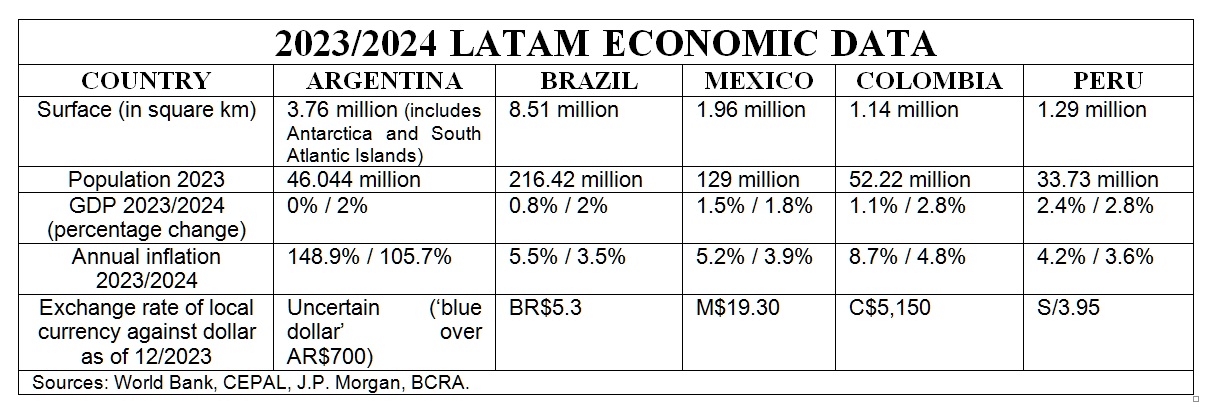
At a general level, Latin America has always been a developing continent. Nevertheless, with 20.42 million km2 and a population of 650 million inhabitants, it remains an attractive market for investment in various industries. According to the World Bank, it is expected that the growth of Latin America and the Caribbean will decelerate to 1.3% in 2023, recovering to 2.4% in 2024. Additionally, Latin America has managed to return to pre-COVID-19 levels of employment and poverty. The World Bank estimates that the region’s average inflation, excluding Argentina, will fall to 5% in 2023 after reaching 7.9% in 2022.
Regarding gaming, LatAm is going through a stage of evolution in online gaming and sports betting, coinciding with advancements in regulation amid and electoral time that, in some cases, may influence these processes in the future.
A significant number of countries have started the path of regulating this segment, with Colombia as a pioneer, followed by Mexico and Argentina, with Peru having new legislation and Brazil recently approving sports betting via a provisional measure.
Simultaneously, affected by the global crisis, the regional economy is experiencing a transitional 2023, looking forward to a next year that, according to various indicators, appears to be more favorable. Therefore, in the following paragraphs, G&M News will consider all these variables in countries such as Argentina, Brazil, Mexico, Colombia, and Peru, focusing on the electoral landscape of each one of those territories.

ARGENTINA
Amid a severe economic crisis in 2023, Argentina is experiencing an extensive electoral calendar. It began in February, and will include all the 24 provinces of the country, each on different dates than the national elections. On the Executive Branch, the primary elections (PASO) will take place on August 13th, and parties that surpass 1.5% of the votes can participate in the general elections on October 22nd, where the president, vice president, and other authorities will be renewed. If no presidential candidate obtains 45% of the votes (or 40% with a 10-point difference over the second candidate), the two most voted candidates will compete in a runoff election, scheduled for November 19th.
As for the regulation of online gaming, each Argentine province has its own legislation. Currently, 17 provinces have regulated iGaming, but it is operational only in 15 of them (Tucuman, Chaco, Misiones, Corrientes, Entre Rios, Santa Fe, San Luis, Buenos Aires Province, Buenos Aires City, La Pampa, Mendoza, Neuquen, Rio Negro, Chubut, and Santa Cruz). The launch is still pending in Formosa and Cordoba. In recent elections in these two jurisdictions, the local authorities were re-elected and will continue to govern. Two other provinces (Salta and Jujuy) are discussing the regulation, while the remaining five (Catamarca, La Rioja, Santiago del Estero, San Juan, and Tierra del Fuego) currently have no intentions yet of regulating iGaming.
BRAZIL
By far the largest country in South America in terms of both area and population, Brazil saw Luiz Inacio ‘Lula’ da Silva win the presidential runoff in October 2022 against the then-president Jair Bolsonaro, who couldn’t secure re-election for a new term. However, beyond the change in the Executive Power, attention is focused on the functioning of a highly fragmented Congress, where the number of represented parties in the Chamber of Deputies has increased from 25 to 30, and in the Senate, from 15 to 20.
In Parliament, they are preparing to give final form to the Bill that will regulate the operations of online bookmakers after the legislative recess. Before that, this way, Lula signed the provisional measure to regulate sports betting operations in the country, a great advance. Now, National Congress will have to approve this document, surety inserting some adjustments to the text.
MEXICO
The Mexican Republic will have its electoral period on July 2nd, 2024, when a new president will be elected to replace the current president, Andres Manuel Lopez Obrador. Next year, the country will also decide on 128 senators and 500 federal deputies, along with the renewal of eight municipal governments and the head of the Mexico City government.
In Mexico, there is an existing but outdated regulation that needs updating, leading to a proliferation of online gambling platforms. Some operate illegally, causing significant financial losses to the Mexican Government in terms of revenue. Various entities, such as the Association of Permit Holders, Operators, and Suppliers of the Entertainment and Betting Industry in Mexico (AIEJA), have urged the Government to optimize the Federal Law on Games and Draws, enacted by then-President Miguel Aleman Valdes in 1947. This renewal would cover the various online betting verticals existing in the country, reinforcing legality and transparency in the sector.
COLOMBIA
In June 2022, Gustavo Petro was elected as the President of Colombia, along with his party associate Francia Marquez, who will lead the Executive branch until 2026. Concerning the legislation of online gaming, Colombia stands as a beacon in the region. It was one of the first countries in Latin America to regulate this sector following the approval of the Colombian Congress in 2016. The regulation governs the operation of gambling websites (currently 16 licensed operators) and tax contributions, primarily allocated to the healthcare sector.
According to the regulatory body Coljuegos, during the first quarter of 2023, approximately C$207 billion (USD 45.04 million) were collected from both land-based and online gambling. These numbers have been increasing year by year.
PERU
In recent times, Peru has experienced different political turmoils, with six presidents in four years. In 2022, Pedro Castillo was removed from office, and Dina Boluarte took his place, becoming the first female president in the history of Peru. However, the Congress is seeking to normalize this irregular situation by calling for early elections this year, although the legislative debate is currently stalled as another faction wants the elections to take place in April 2024.
Regarding the gaming segment, the Peruvian Government enacted Law 31.806, which modifies certain aspects of the regulation of online gaming and sports betting. The goal is to ensure that both foreign and domestic betting operators contribute equally through a 12% tax on their net income (net win).

